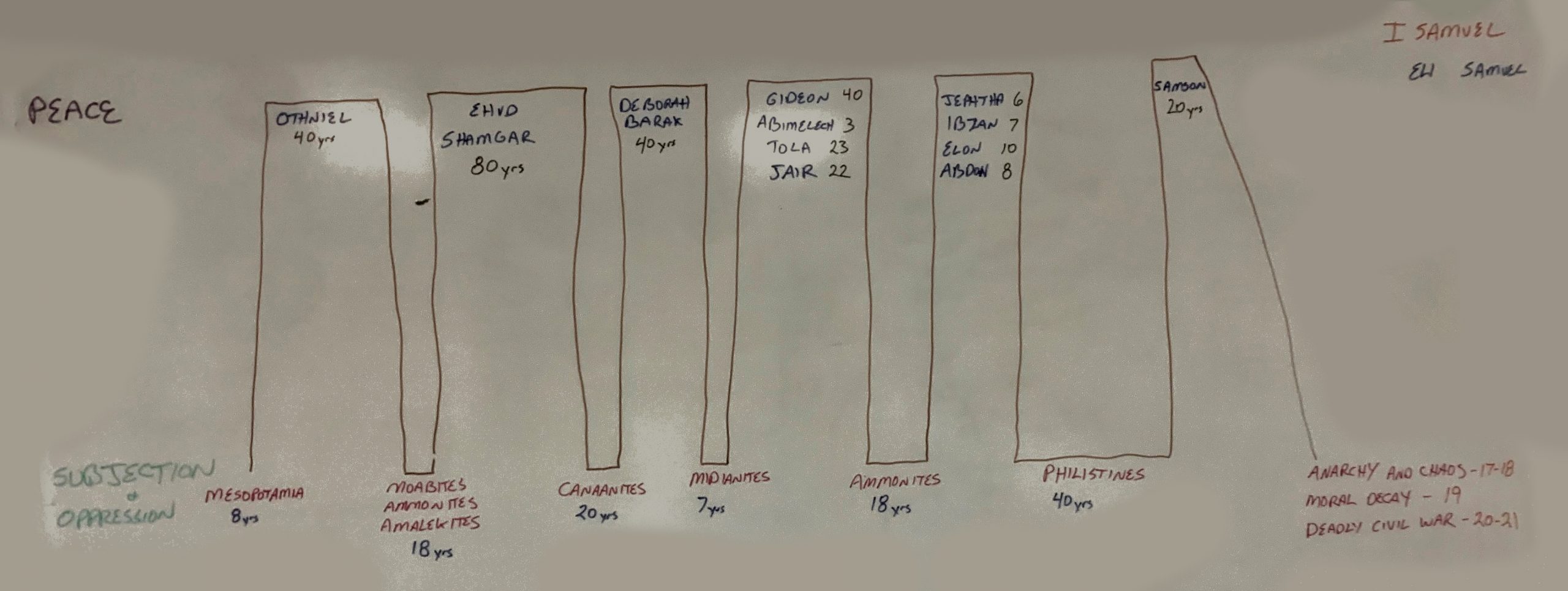011920SS-The Book Of Judges.mp3
JUDGES – God’s Faithfulness In The Light Of Israel’s Failures
Judges is a sequel to the book of Joshua. It continues the history of the Commonwealth of Israel. The title of the book is derived from the judgeship of 13 judges.
The book spans a period of some 300 years – 265 years for the book – 335 years from 1st Judge to the 1st King Saul
The JUDGES OF ISRAEL
OTHENIEL
EHUD
SHAMGAR
DEBORAH and BARRAK
GIDEON
ABIMELECK
TOLA
JAIR
JEPHANAH
IBZAN
ELON
ABDON
SAMPSON
Eli
Samuel
This stage records the saddest and most sordid period in the entire history of Israel. It is the dark ages of that nation.
The book reveals the principle of human collapse. Everything tends to degenerate unless an outside influence intervenes. Man is hopeless unless the Lord God intervenes and regenerates man. The policies of the people in the book were based upon the situation ethics of secular humanism (Judges 17:6; 21:25). Apostasy, apathy, and anarchy were the fruit. When humanistic judges rule a nation, absurd behavior will occur as recorded in this book. The Judges ruled spasmodically because the people wavered between personal opinion or public opinion and the laws of God for the authority of the land.
The first chapter in the book is very important because it teaches partial obedience leads to apostasy. Partial obedience is disobedience. They avoided the negative aspects of the destruction of religious apostasy. The thorns (Muslims) desire to completely annihilate the Jews today.
Important names in this period would include Gideon, Samson, Naomi, Ruth, Boaz, Eli, and Samuel.
It records seven apostasies on Israel’s part, seven servitudes to seven heathen nations, and seven deliverances.
The 7 recorded apostasies in the book resulted in the 7 periods of slavery and tribute to 7 nations (Proverbs 12:24). Each apostasy began when the people rejected the authority of God’s Word. When a church or family, or nation rejects the inspired words of God, apostasy and anarchy and bondage will ensue (Ezekiel 33:30-33; 2 Timothy 4:2-4; Revelation 3:14-22).
The Jews ridiculous cycle of life:
Bible, Blessings and fruitfulness (Joshua 1:8)
Ingratitude (Deuteronomy 8:11-20; Romans 1:21)
Covetousness and idolatry, slavery (Proverbs 12:24)
Prayer for deliverance, prophet or judge sent, and revival to the Word of God.
The solution for this monotonous cycle is found in Psalm 107:8, 15, 21, 31. Appreciation and gratitude for God’s blessings change covetousness to contentment, which avoids the slavery and frustration of debt (Eccl. 5:18-20; Philippians 4:11; I Timothy 6:6-10).
Never forget the first step down the road to apostasy, apathy, and anarchy is ingratitude – – (Romans 1:21).

